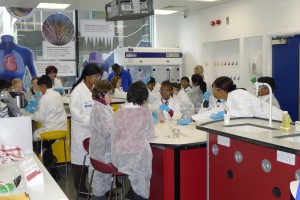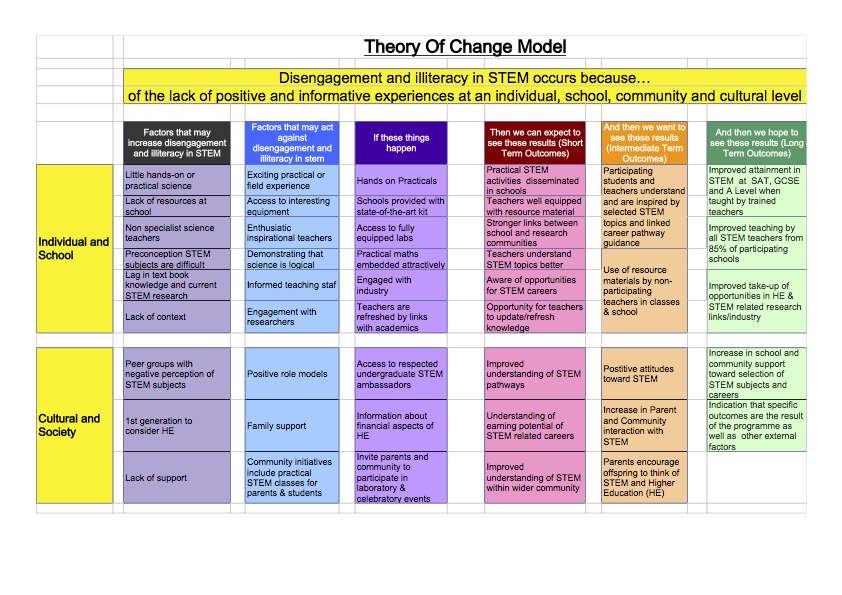Science Communication
Robert Winston is committed to scientific education and tries to communicate the excitement of science through his award winning BBC programmes, books and lectures. He has written over twenty popular science books. For a full bibliography please click here.
He continues to give public lectures in a large number of British and overseas universities and regularly visits schools throughout the UK. If you are a teacher, lecturer or student and would like Professor Winston to visit your institution, please contact Helen in his office.
As Professor of Science and Society at Imperial College London, Robert is keen to ensure that science and scientific thinking reaches as wide an audience as possible.
Wohl Reach Out Lab
In 2010 he set up an innovative teaching programme for school children at Imperial College London that aims to give children a taste of real science and allow them to do experiments first hand.
The concept of the Reach Out Lab (ROL) followed the findings of the House of Lords Select Committee for Science and Technology. The first enquiry, chaired by Lord Winston in Parliamentary session 2000-1, addressed falling interest and attainment in schools’ science. It heard evidence that a major problem for STEM education was a lack of practical work which engaged school students, inadequate opportunity for professional career development for teachers, and too few inspirational teachers acting as role models. A further, more extended enquiry chaired by Lord Broers in 2006 and again in 2007, confirmed these findings. Witnesses also emphasised that teachers frequently lack confidence in undertaking practical work and that school labs and technical help were often deficient.
…pupils were taught things they would never have encountered in the primary curriculum
As a direct result of these findings the Reach Out Lab was established at Imperial College to conduct lessons in all aspects of science and maths. As well the possibility to improve STEM learning, the project was established with research potential in mind to:
- assess best teaching practice
- measure the short and long-term impact on school students’ learning
- investigate how teachers conducted lessons when they returned to the school environment
- see if the programme encouraged more undergraduates from a Russell Group university to consider teaching as a career.
The Wohl Reach Out Lab relies on the support of many donors, and is particularly grateful to the Wohl Foundation.
Reaching Further
Whilst the ROL can only offer practical science to around 7,000 school students a year, the Reaching Further programme, has been set up in well-equipped participating schools away from Imperial College’s main campus. These hubs are visited by Imperial staff and work in conjunction with local teachers. It was also considered that the impact of the programme would be much greater if we could involve other universities in partnerships, and so far the Universities of Southamptom, Sheffield Hallam, Bradford and several others are forming close links and working collaboratively. For more information please visit Imperial College Outreach.
A group of children do a simulated operation in the Lab
What Teachers and Pupils say about us:
Teacher Comments:
“It gave the children a chance to team-build and expand their existing learning”
“The mentors were great”
“Robotics, astronomy and CSI activities have excellent resources and enthusiastic instructors.”
“Watching the children engage with unfamiliar activities was very enjoyable – Seeing them learn new skills and apply existing knowledge. I personally enjoyed experiencing the wide range of activities as well as being within an exciting Campus of Imperial (a great inspiration for the kids)”
“The way the children were able to work independently from the adults but in a team to share knowledge and ideas with each other about the activities.”
“The very interesting topics that I would not have thought about doing”
“Participating in well-planned science activities with motivated pupils who would not have the opportunity to work in University facilities otherwise”
“Everything was fantastic. Thank you very much. The children really enjoyed their time at Imperial. They were always engaged and full of questions”
“I enjoyed being involved in exciting hands-on science and being given the opportunity to work with the children and being taught by scientists who are passionate about their subjects”
“The fact that pupils were taught things they would never have encountered in the primary curriculum”
Pupils’ comments:
“It was just really fun and I enjoyed every bit!”
“I enjoyed visiting the University because I haven’t been to one before and I enjoyed making friends”
“I made loads of friend and i’m quite keen to go back here for Uni”
“I learned how to make hard things simple!”
“CSI Day because solving a mystery is what I have always wanted to do and there was a perfect balance of learning and fun”
The Theory behind the Reach Out Lab
This flow diagram above gives a view of the Theory of Change concepts that motivate educational developments in the ROL.


